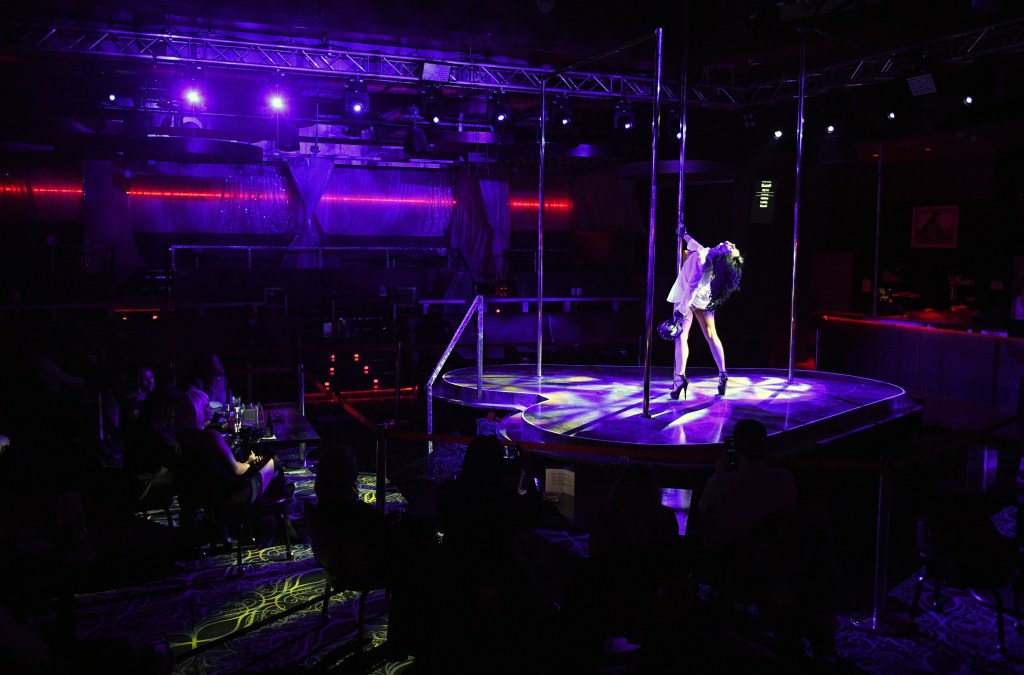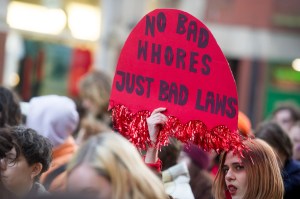Sex work advocacy groups from Queensland – fresh off a national sex work decriminalisation campaign – are confident they could be the next Australian jurisdiction to decriminalise sex work. But the current framework for doing so would leave one of the industry’s largest cohorts incredibly vulnerable: strippers.
A crucial stipulation of the state’s current law strictly forbids dancers from soliciting sex at a licensed strip club, or offering “extras” like performative masturbation, oral sex, penetrative sex, or anything to do with anal, even if there technically isn’t any physical contact between a worker and their client.
Videos by VICE
Strippers are worried, though, because sometimes the very nature of their work can force them to toe the line.
“We deserve the same rights to work health and safety protections, and for our work not to be criminalised, as any other sex worker,” said Raven Inferno, a dancer working in Queensland. She told VICE that if she and her colleagues are left out of the state’s decriminalisation framework, as has been proposed, “the police attention will just shift onto us”.
Queensland’s Law Reform Commission (QLRC) is expected to hand down a framework for the decriminalisation of sex work by November this year. So far, sex work advocacy groups have been broadly receptive of the move.
For Janelle Fawkes, a campaign manager at Queensland sex work advocacy group Respect Inc. and a member of the sex work peer support network Decrim QLD, it’s important the bill that comes as a result addresses three major concerns.
The first is that the Criminal Code as applied to sex workers is repealed. The second is that the Prostitution Act, which puts anyone offering sex work services outside of a licensed brothel afoul of the law, is also repealed. The third is that police powers, which are often reported to result in racial profiling and general overreach across the state, are drastically hemmed in.
“Most sex work workplaces in Queensland are criminalised under the current laws,” Fawkes told VICE. “So even safety strategies, as we call them, are illegal.”
“So is having a driver transport you between bookings, or even being in the same hotel as another sex worker offering sex work services to a client. So if you’re a touring sex worker – and in many cases, even if you’re a local – you’re not necessarily going to know how many laws you might be breaking,” she said.
“There’s lots of aspects of the laws that just don’t make sense – police have extraordinary powers in relation to sex work.”
But Fawkes, along with a number of her colleagues, is hopeful this could be their year.
With a cautious optimism, she said it would be an undeniable win but might as well not happen if it doesn’t go “all the way” and repeal all harmful legislation. When it comes to strippers, Fawkes sees room to move.
“It feels like it’s kind of locked into an argument of semantics with the QLRC now, where they’re saying ‘We’re not covering it, because it’s already covered by the adult entertainment permits’,” Fawkes said.
“But actually, what we’re talking about is not covered by those permits. In fact, it’s specifically excluded,” she said.
Should strippers not eventually find coverage in the state’s new decriminalisation framework, they and the advocacy groups that go to bat for them are concerned that the industry will continue to see businesses take advantage of the vulnerability that comes with working illegally.
For instance, a stripper that solicits sex work on-site at a licensed club, and is then later harassed or assaulted, has no way of lodging a complaint to a body like Fair Work – let alone police – as the crimes committed against them are predicated on a crime to begin with.
“I’ve had to pick up girls from clubs because they’ve been spiked within the venue held against their will, the ambulance has failed to be called, and I’ve had to rock up and take the dancer to a hospital, and then the next day they’ve been fired, for being spiked, and there’s nothing we can do about it,” Raven said.
“Hospitals often don’t take this complaint seriously, either. And they don’t do the drug testing and so you can’t really submit a complaint or even a police report without a toxicology report,” she said.
“And so the venue’s point of view is, ‘Well, you’re creating waves because you’re a victim of a crime in my venue, and that’s going to bring attention to licensing and get me in trouble, so you can go, bye-bye.’”
Raven’s experiences aren’t isolated events, either. In late April, it was reported by the ABC that a dancer at a strip club in Adelaide called “The Firm” alleged that one of her colleagues was sexually assulted during a private dance at the club.
Luna, the dancer who spoke to the ABC, said that after she raised concerns about the club’s lacking safety measures – in an attempt to protect her colleagues – she was abruptly dropped by the club. Like in Queensland, South Australian laws forbid any sort of sexual touching inside strip clubs, but Luna persisted, and mounted legal action against the club anyway, in a bid to point to what she claimed was an “exploitative work culture”.
Not long after, the club reached a confidential out-of-court settlement with Luna, despite denying all the allegations levelled against it. Raven said Luna’s experience at The Firm is common practice and should be seen as a case study for stronger protections for strippers both in the workplace and under criminal law.
“A lot of the time, I found that when you speak up about something that’s wrong you suddenly get taken off the roster indefinitely,” Raven said.
“That’s the case for myself – there’s only one venue left in Queensland that I’m ‘allowed’ to work at because I don’t allow for these sorts of things to just slip through the cracks, especially when they happen to myself or colleagues I have in the industry,” she said.
Raven hopes the QLRC will be open to coming to the table to reconsider its position on strippers before it hands down a final framework at the end of the year.
After all, she said, she just wants to be able to go to work and be granted the same protections offered to everyone else.
Follow John on Twitter.
Read more from VICE Australia.






